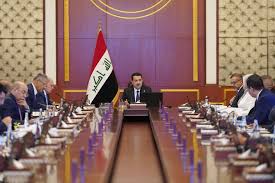Dr. Majid Rafizadeh
Iraq is moving in a direction aimed at fostering socioeconomic developments. One of the key pillars of the country’s transformation lies in its approach to attracting foreign direct investment and prioritizing infrastructure development, thereby setting the stage for sustainable growth and improved living standards for its citizens.
In a landmark move signaling the commitment of Iraqi authorities to the nation’s development, the parliament last year approved a record-breaking budget for the years 2023 to 2025. This historic budget, totaling 198.9 trillion Iraqi dinars ($153 billion), earmarks substantial funds for critical infrastructure projects and expansion of the public sector. With Iraq’s population projected to double by 2050, the allocation of resources to infrastructure development is not only a necessity but a strategic imperative.
The significance of this budget cannot be overstated. First of all, decades of underinvestment have left the nation’s infrastructure in dire need of repair and modernization. Roads, bridges, schools, hospitals and utilities have suffered neglect, hindering economic growth and impeding social progress. By prioritizing infrastructure development, the government is laying the groundwork for a more resilient and prosperous Iraq that is capable of accommodating its burgeoning population and fostering economic diversification. It is also important to point out that the plan to recruit more than half a million new public sector workers underscores the government’s commitment to addressing unemployment and bolstering public services. This creation of jobs will not only reduce unemployment but also stimulate consumer spending and drive demand, further fueling economic growth.
Secondly, the Iraqi administration has embarked on a resolute campaign to tackle corruption, acknowledging that this not only impedes development but also corrodes public trust in governmental institutions. Corruption diverts valuable resources from essential public services and serves as a significant deterrent to potential investors by undermining confidence in the integrity and transparency of the business environment. Anti-corruption efforts are a fundamental pillar of effective governance. The restoration of accountability, transparency and ethical conduct are prerequisites for attracting foreign direct investment and fostering a conducive climate for business growth and investment. The Iraqi administration’s multifaceted anti-corruption approach, which aims to root out malfeasance at all levels of government, includes reforms within the state institutions responsible for combating corruption, stringent rules on financial disclosures by senior officials and the establishment of a specialized security force dedicated to investigating corruption cases. These measures have sent the clear message that corruption will not be tolerated and perpetrators will be held accountable. The important issue here is that cracking down on corruption not only restores confidence in Iraqi governance, it also makes the country more attractive to foreign investors. In other words, transparency and accountability are cornerstones of a thriving investment climate and Iraq’s commitment to upholding these principles is a testament to its seriousness about reforms and progress.
In addition, recognizing the need for diversification and sustainable growth, Iraqi authorities have embarked on ambitious initiatives designed to attract foreign investment and forge international partnerships. One such endeavor is the Development Road project, a large-scale infrastructure initiative that aims to improve connectivity and enhance Iraq’s geoeconomic significance. The project represents a pivotal step in Iraq’s journey toward economic diversification and global integration. Its twofold objective is to reduce the country’s reliance on oil revenue while simultaneously elevating Iraq’s stature as a pivotal nexus for regional and international trade. Strategically located at the crossroads between the Gulf, Asia and Europe, Iraq offers inherent advantages as a transit point for goods and commodities. By capitalizing on this advantageous geographical position, the Development Road project seeks to harness the full potential of transit trade and logistics, thereby unlocking previously untapped revenue streams and catalyzing economic expansion.
Through the development of modern transportation infrastructure and logistical networks, Iraq’s aspirations include streamlined trade flows, reduced costs and enhanced efficiency, thereby attracting investment and fostering sustainable growth. In doing so, Iraq will not only mitigate the risks associated with overreliance on oil but also diversify its economy, fortifying its resilience against external shocks and laying the foundation for a more prosperous future. Partnerships that have been forged with foreign stakeholders, notably including China, also exemplify Iraq’s steadfast dedication to fostering robust international cooperation aimed at mutual prosperity. These collaborations represent a strategic alignment of interests, wherein Iraq seeks to leverage the expertise, resources and technological advancements of foreign partners to advance its own developmental goals.
By engaging in joint endeavors encompassing infrastructure projects, investment initiatives and technological exchanges, Iraq is poised to reap multifaceted benefits that extend beyond mere economic gains. Through such partnerships, the country can also gain access to cutting-edge technologies, best practices and innovative solutions, thereby enhancing its capacity for sustainable development and bolstering its competitive edge in the global arena. Moreover, these collaborations facilitate the transfer of knowledge, enhancement of skills and development of human capital, thereby empowering Iraq to build a more resilient and dynamic economy capable of weathering future challenges. By embracing a collaborative approach to international engagement, therefore, Iraq not only fosters mutual prosperity but also reinforces its position as a key player on the global stage.
By prioritizing infrastructure development, combating corruption and fostering foreign investment, Iraq is laying the groundwork for sustainable growth and prosperity. As the nation continues down its path of reform and renewal, it serves as a beacon of hope. Iraq’s positive trajectory is a testament to the resilience and determination of this nation and its people.







